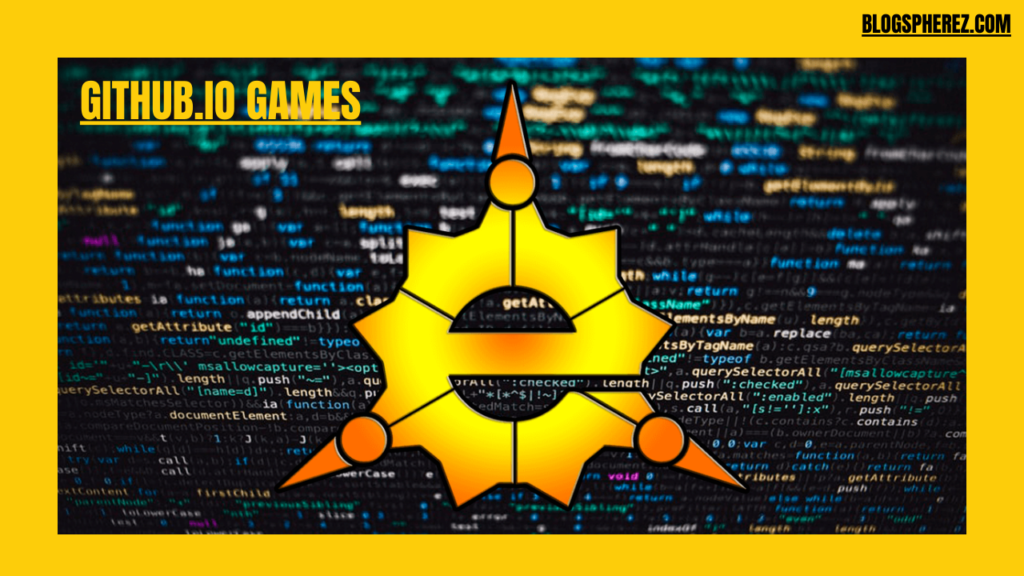Introduction
GitHub.io games refer to a collection of web-based games hosted on GitHub Pages, allowing developers to showcase their projects and users to play games directly in their browsers. These games often encompass various genres, including puzzle, racing, and multiplayer experiences, and are typically built using HTML, CSS, and JavaScript. The platform not only serves as a space for gaming but also encourages collaboration among developers, as many of these projects are open-source, enabling others to contribute or modify the games. This makes GitHub.io a vibrant hub for both gaming enthusiasts and aspiring game developers to explore and innovate.
What Are GitHub.io Games?
GitHub.io games are browser-based games hosted on GitHub Pages, a feature of GitHub that allows developers to publish web projects directly from their repositories. These games often utilize open-source technologies, such as HTML5, JavaScript, and CSS, making them easily accessible and modifiable. The games range from simple, arcade-style adventures to complex, multi-level role-playing games (RPGs), all of which run directly in a web browser.
These games provide an excellent platform for hobbyists and professionals alike to experiment with game development. By hosting their games on GitHub.io, developers can showcase their projects, collaborate with others, and invite feedback from the gaming community.
Why GitHub.io Games Are So Popular
GitHub.io games have gained popularity for several reasons. The platform supports both gamers and developers, offering benefits that are difficult to find elsewhere.
1. Free and Accessible to All
Anyone with an internet connection can play GitHub.io games for free. There is no need to download or install additional software, making it incredibly convenient. Gamers can play directly in their browsers, and developers can upload their games without any hosting fees.
2. Open-Source Collaboration
GitHub.io games embrace the open-source ethos, allowing developers to share their code with others. This collaborative nature fuels creativity and innovation, as anyone can modify or improve a game’s source code. Aspiring game developers can learn by studying these repositories, forking them, or contributing new features.
3. Learning Opportunities for Developers
For those interested in game development, GitHub.io games provide hands-on learning opportunities. Developers can explore real-world examples of how games are built using web technologies. GitHub’s version control system also enables them to track changes and understand the evolution of a project.
How to Find and Play GitHub.io Games
Accessing GitHub.io games is simple. Players and developers can either visit the repository of a specific game or search GitHub directly to find repositories tagged with “game,” “HTML5,” or “JavaScript.”
Step 1: Search for GitHub.io Games
Start by exploring GitHub’s search functionality or visiting GitHub Pages where developers host their games. Some of the most popular repositories aggregate collections of GitHub.io games, making it easy to find something that matches your interests.
Step 2: Play the Game
Once you locate a game, look for the link to its GitHub.io page, typically found in the repository’s README file. Clicking the link will load the game in your browser, allowing you to play instantly.
Step 3: Fork and Modify (For Developers)
For developers interested in creating their own versions of a game, GitHub.io allows you to fork the repository and start modifying the code. You can then host your version on your own GitHub Pages, contributing back to the community by submitting improvements or bug fixes.
Types of Games You’ll Find on GitHub.io
GitHub.io hosts a diverse collection of games that cater to a wide array of gaming preferences. Whether you enjoy quick, arcade-style challenges or more in-depth, story-driven experiences, you’ll find something engaging. Here are some popular categories of games hosted on GitHub.io:
1. Puzzle Games
Puzzle games remain a favorite among GitHub.io developers and gamers alike. These games test logic, reasoning, and problem-solving skills. Popular examples include clones of classics like Sudoku, Minesweeper, and even original creations that offer new challenges.
2. Platformers
Platform games are a staple of GitHub.io’s game library. These games involve navigating a character through levels filled with obstacles, enemies, and puzzles. Players typically need to jump, run, and fight to complete the objectives. Many of these games are designed in the style of old-school, 2D side-scrollers.
3. Role-Playing Games (RPGs)
Some GitHub.io developers take on the challenge of creating browser-based RPGs. These games involve rich storytelling, character development, and turn-based combat. Though creating an RPG is a complex task, GitHub.io developers often collaborate to build intricate and immersive worlds.
4. Arcade Games
Arcade-style games offer short bursts of entertainment with simple mechanics and increasing difficulty. Developers often create games inspired by classic titles such as Pac-Man, Tetris, and Space Invaders. These games are great for quick play sessions and emphasize skill over long-term commitment.
5. Strategy Games
For gamers who enjoy planning, tactics, and decision-making, GitHub.io hosts a variety of strategy games. These include tower defense games, turn-based strategy, and even simulations where resource management plays a key role.
How Developers Create Games on GitHub.io
GitHub.io offers game developers a robust platform for creating and hosting browser-based games. The development process typically follows these steps:
1. Choosing the Right Technology Stack
Developers building GitHub.io games primarily use web technologies such as HTML5, CSS3, and JavaScript. HTML5 provides the structure, CSS handles the design and aesthetics, and JavaScript manages game logic and interactions.
For more complex games, developers might incorporate libraries like Phaser.js or Three.js, which offer advanced functionalities for 2D and 3D game development, respectively.
2. Using GitHub for Version Control
One of the biggest advantages of GitHub.io is the built-in version control system that GitHub offers. Developers can manage and track changes to their code through Git, allowing them to experiment without fear of breaking their game.
GitHub’s collaborative features also make it easy for multiple developers to work together on the same game, providing feedback and submitting pull requests for improvements.
3. Hosting on GitHub Pages
Once the game is developed, hosting it on GitHub Pages is straightforward. Developers only need to create a repository, upload their game’s files, and enable GitHub Pages. This makes the game publicly accessible and easy to share with others through a simple URL.
4. Open-Source Community Contributions
GitHub’s open-source ecosystem encourages contributions from other developers. Game creators often welcome input from the community, whether in the form of bug reports, feature requests, or direct contributions to the codebase. This community-driven development fosters rapid improvement and innovation.
Success Stories: Popular GitHub.io Games
Several GitHub.io games have achieved widespread popularity due to their innovative gameplay and active developer communities. Here are some notable success stories:
1. 2048 by Gabriele Cirulli
Originally developed by Gabriele Cirulli, 2048 is one of the most famous GitHub.io games. This simple yet addictive puzzle game challenges players to combine numbered tiles to reach the elusive 2048 tile. Since its release, 2048 has inspired countless clones and variations, demonstrating the collaborative potential of GitHub.io games.
2. Hextris
Hextris is another wildly popular GitHub.io game that mixes elements of Tetris with hexagonal gameplay. The game’s open-source nature has encouraged developers to fork the repository and create new versions with additional features, further enhancing the original concept.
3. Space Invaders Clone
GitHub.io also hosts several tributes to classic games, such as Space Invaders. These browser-based versions bring nostalgic gameplay to modern audiences, while developers add their own twists to keep the game fresh.
The Educational Value of GitHub.io Games
Beyond entertainment, GitHub.io games serve as an invaluable educational tool. They provide a practical way for budding developers to learn coding, offering an interactive and rewarding experience. Developers who contribute to or build these games gain hands-on experience with version control, game development, and collaboration.
1. Learning Web Development Through Games
Many developers create GitHub.io games as learning exercises. By developing a game, they practice key concepts in HTML, CSS, and JavaScript. Game development also introduces more advanced topics like game physics, object-oriented programming, and event handling.
2. Studying Open-Source Projects
For those just starting in game development, studying open-source GitHub.io games provides valuable insights. Developers can examine code to learn how others structure their projects, solve common problems, and implement features.
3. Encouraging Creativity
GitHub.io games foster creativity. Developers can experiment with different ideas, collaborate with others, and iterate on their designs. By engaging with a community of like-minded individuals, developers grow both technically and creatively.
Challenges Faced by GitHub.io Game Developers
While GitHub.io provides a powerful platform for game development, developers still face certain challenges. Understanding and overcoming these challenges can help ensure the success of a project.
1. Performance Limitations
Browser-based games often face performance issues, especially when dealing with complex graphics or intensive logic. Developers must optimize their code and use efficient algorithms to ensure their games run smoothly on different devices.
2. Balancing Creativity with Technical Constraints
Developing a game within the limitations of browser-based technologies requires a balance between creativity and technical constraints. GitHub.io developers need to find innovative ways to create compelling gameplay while staying within the boundaries of what is feasible on the web.
3. Attracting a Player Base
Unlike traditional game distribution platforms like Steam or mobile app stores, GitHub.io games rely on word-of-mouth and community engagement to attract players. Developers need to promote their games actively and foster a community to build a dedicated player base.
Conclusion
GitHub.io games represent the intersection of creativity, collaboration, and innovation within the gaming world. As an open-source platform, GitHub.io empowers developers to experiment, learn, and share their projects with a global audience. Gamers benefit from a diverse selection of free, browser-based games that offer endless fun and challenge.
Whether you are a player looking for new gaming experiences or a developer seeking to hone your skills, GitHub.io offers something for everyone. By embracing the spirit of collaboration, the platform continues to push the boundaries of what’s possible in browser-based gaming.
Also Read: Pedrovazpaulo Executive Coaching: Transforming Leadership
FAQs
1. What are Git Hub.io games?
Answer: GitHub.io games are web-based games hosted on GitHub Pages, allowing users to play them directly in their browsers without any downloads. These games are typically created using HTML, CSS, and JavaScript.
2. How can I find games on Git Hub.io?
Answer: You can find games on GitHub.io by searching for specific repositories or exploring popular game projects on GitHub. Many developers also share links to their games through social media or gaming communities.
3. Are GitHub.io games free to play?
Answer: Yes, most GitHub.io games are free to play, as they are often developed as open-source projects by developers looking to showcase their skills and creativity.
4. Do I need to download anything to play these games?
Answer: No, you do not need to download anything. You can play the games directly in your web browser by visiting the specific GitHub Pages link for each game.
5. Can I contribute to GitHub.io games?
Answer: Yes! Many GitHub.io games are open-source, meaning you can contribute by forking the repository, making changes, and submitting pull requests to the original developers.
6. What types of games can I find on GitHub.io?
Answer: You can find a wide variety of games on GitHub.io, including puzzle games, platformers, racing games, and multiplayer experiences, among others.
7. Are there any system requirements for playing these games?
Answer: Generally, as long as you have a modern web browser with JavaScript enabled, you should be able to play most GitHub.io games without any specific system requirements.
8. How do I report issues or bugs in a game?
Answer: If you encounter issues or bugs while playing a game, you can usually report them by visiting the game’s GitHub repository and opening an issue in the “Issues” section.






